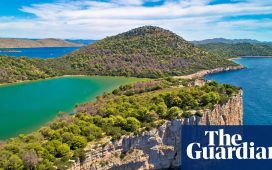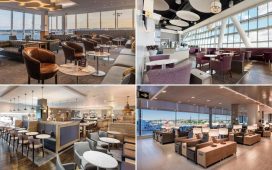With the approach of the summer holidays, the two French seaside towns of Saint-Valery-sur-Somme and Le Crotoy would normally be gearing up for the annual wave of tourists from neighbouring Belgium and, above all, from the UK.
The resorts sit opposite each other across the majestic Bay of the Somme, a wetland of shifting sands and tides where the tranquil river suddenly expands into a spectacular estuary opening up into the Channel. The bay is a popular stop-off for British travellers heading to Paris and the south of France, as well as a place of pilgrimage for its war memorials, museums, cemeteries and battle sites.
But this is not a normal year. France is just coming out of a lengthy lockdown and six months of early-evening curfews, with customers not allowed inside bars and restaurants until 9 June. Belgian visitors are few and far between as most await the implementation of the EU digital Covid passport to plan their holidays, hoping to avoid PCR tests each time they cross a border. And the British are simply absent, with France on the UK’s amber list.

Locals in Saint-Valery feel that Brexit repercussions may make this more than a temporary trend. As I walked through Saint-Valery’s port this week, everything is still very quiet, with plenty of space in restaurants and hotels. I easily get a table on the sunny terrace of Les Pilotes, looking out over the bay, and order a seafood platter of oysters, prawns and crab with a chilled muscadet – a taste of what everyone loves about France. I am the only foreigner around.
Laurence Gautier, who transformed the Pilotes into an elegant boutique hotel and restaurant 10 years ago, says: “We are having to rely on local French tourism this year, and definitely missing the more affluent visitors who usually come from the UK and Belgium. The restaurant has lost 40% capacity with social distancing rules, and our international clientele – who do not quibble with prices and are always ready to order a good bottle of wine – has so far disappeared.”

I have flown in from Italy and, after a lifetime of travelling around Europe, was shocked to be asked by the immigration officer for proof of where I live. He sighed with relief when I produced my new French residence permit – which meant he could let me in without an interrogation.
Joël and Vanessa, my hosts at Au Presbytère – a B&B in an 18th-century former priory, with rooms in the house and in Gypsy caravans in the garden – have not had any bookings from British holidaymakers since last summer. “We bought the place in 2019, and for our first year – before the pandemic – we had a steady stream of British guests, either stopping off after arriving in France or on their way back home for a last French meal at our table d’hôtes. We hope they will be back soon, as this year is obviously not easy with our mostly French holidaymakers reluctant to book too far in advance, and always asking about our cancellation policy. It is all very ‘what if?’, with everyone dreading a new wave of Covid.”
Of the hip boutiques lining Saint-Valery’s high street, one of the most popular is foodie deli La Sardine. “When I opened La Sardine in 2009, I had to speak English all the time,” says owner Anne-France Rouxel. She has not uttered a word of the language for the past 12 months.

“Over the past 10 years, the bay has changed,” she adds. “It is becoming a destination for outdoor nature activities, with innovative restaurants opening, old-fashioned hotels and B&Bs getting chic makeovers and specialist shops popping up, showcasing design, crafts and local gourmet specialities. A more sophisticated traveller started arriving, not just from the UK but from Brussels, Paris and Lille. Then the Brits started buying property here, too. Several houses in my road have English and Scottish owners, but everything has changed since Brexit. One family has French nationality and refuses to return to Britain, but I haven’t seen the others for a year and half – their houses are boarded up and are just waiting to be sold off. So all I can say is: please come back, we miss you.”













